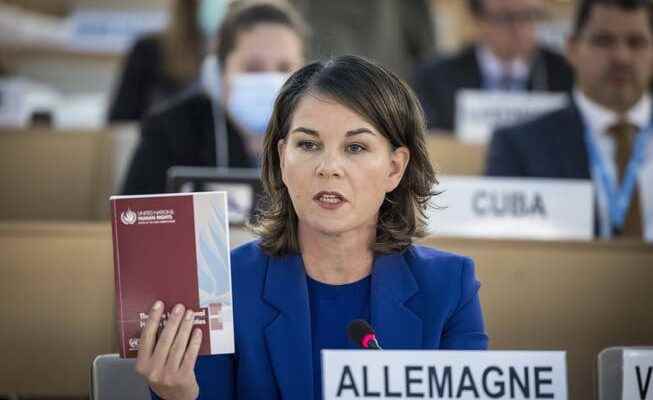A motion by Germany and Iceland for an independent commission of inquiry into state violence in Iran has been approved by a large majority. The vote sends a clear signal against impunity.
The German Foreign Minister holds a copy of the UN Civil Pact in front of the UN Human Rights Council and reminds that Iran is also obliged to fully respect human rights.
The scenes from the Kurdish regions of Iran were recently reminiscent of a civil war. A video from the town of Javanrud shows a group of uniformed men firing along a deserted, rubble-strewn street. Residents of Javanrud, Bukan, Mahabad and other cities in western Iran report dead bodies on the streets and the use of machine guns and helicopters. According to Iran Human Rights 72 people were killed last week alone, 56 of them in the Kurdish areas.
In view of the regime’s violence, activists have been calling for the establishment of an independent commission of inquiry for weeks. On Thursday, Germany and Iceland submitted a corresponding resolution to the UN Human Rights Council for a vote. The investigation is intended to collect evidence in Iran that would later stand up in court, said German Foreign Minister Annalena Baerbock, who had traveled to Geneva especially for the special session.
She used to be at many demonstrations herself, sometimes with prams, said the Green politician. In democratic countries, it goes without saying that you can come home safely afterwards. In Iran this is not the case. Since the protests began in mid-September, according to Iran Human Rights killed at least 416 people, including 51 minors and 27 women. 55 security forces are said to have lost their lives in clashes.
Full-blown human rights crisis in Iran
The UN human rights commissioner Volker Türk spoke of a “full-blown human rights crisis” in Iran. “It pains me to see what is happening in the country. The images of killed children. The women being beaten up in the streets. The people who are sentenced to death, »said the Austrian diplomat, who took over the post of High Commissioner for Human Rights in October, succeeding Chilean Michele Bachelet.
The Iranian representative Khadijeh Karimi accused Germany and the other western states of hypocrisy because their sanctions violated the human rights of the Iranians themselves. In the Council, Iran could count on the backing of China, Venezuela and Pakistan. Russia, which is also working increasingly closely with Iran militarily, is no longer a member of the council after being suspended in April over the invasion of Ukraine.
In the end, a large majority voted in favor of the resolution: 25 of the 47 members of the Human Rights Council voted to set up an independent inquiry, and 16 countries abstained. In addition to China, Pakistan and Venezuela, only Armenia, Eritrea and Cuba opposed the resolution. Earlier, China failed with a last-minute amendment that would have scrapped the creation of a commission of inquiry.
? BREAKING
At its 35th special session, the @U.N Human Rights Council decided to create a new fact-finding mission to investigate “alleged #HumanRightsViolations in the Islamic Republic of #Iran related to the protests that began on 16 September 2022.”#SS35 pic.twitter.com/d1wqPCC7fy
— UN Human Rights Council (@UN_HRC) November 24, 2022
The world is closely following what is happening
The vote is a clear signal against impunity and a signal to Iran that the world is watching its crackdown on the demonstrators closely. However, it will not be easy to collect evidence that can be used in court, as Iran will hardly allow the investigative committee access to the country. Since foreign journalists and human rights activists cannot move freely in Iran either, reliable information on the protests is rare.
There is also great concern for the more than 15,000 people who have been arrested since the protests began. Torture and sexual violence are rampant in the country’s overcrowded prisons. Many detainees report that their bones have been broken in detention. According to Amnesty International, at least 6 prisoners were sentenced to death, along with 21 others threatens the death penalty. Among them are said to be rappers Saman Yasin and Toomaj Salehi who sharply criticized the regime in their songs.
